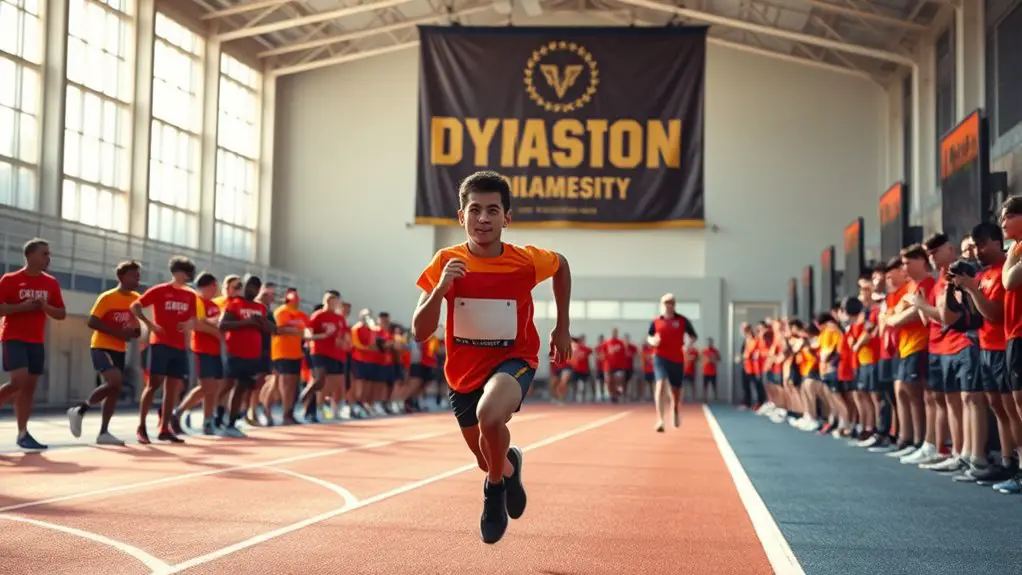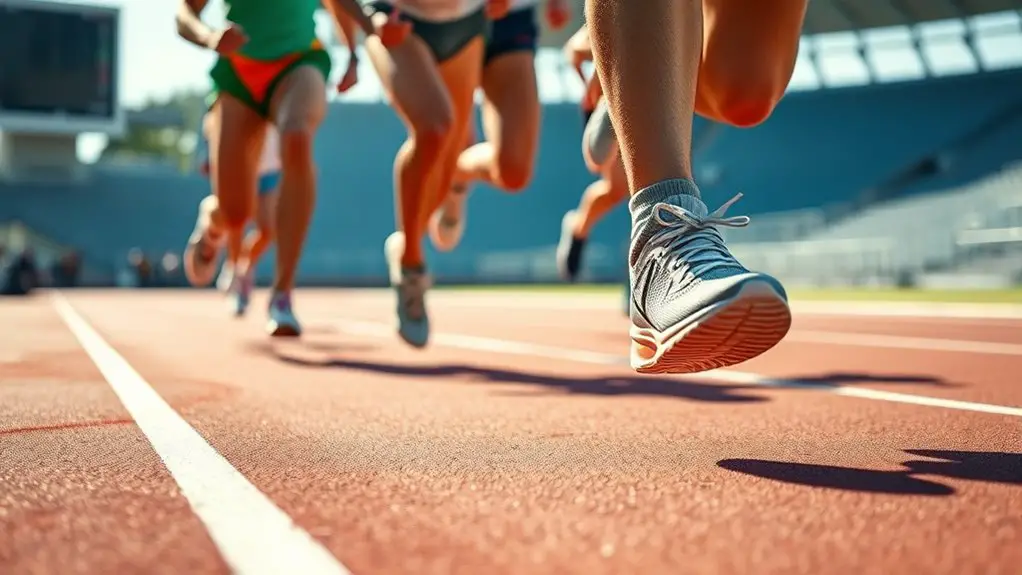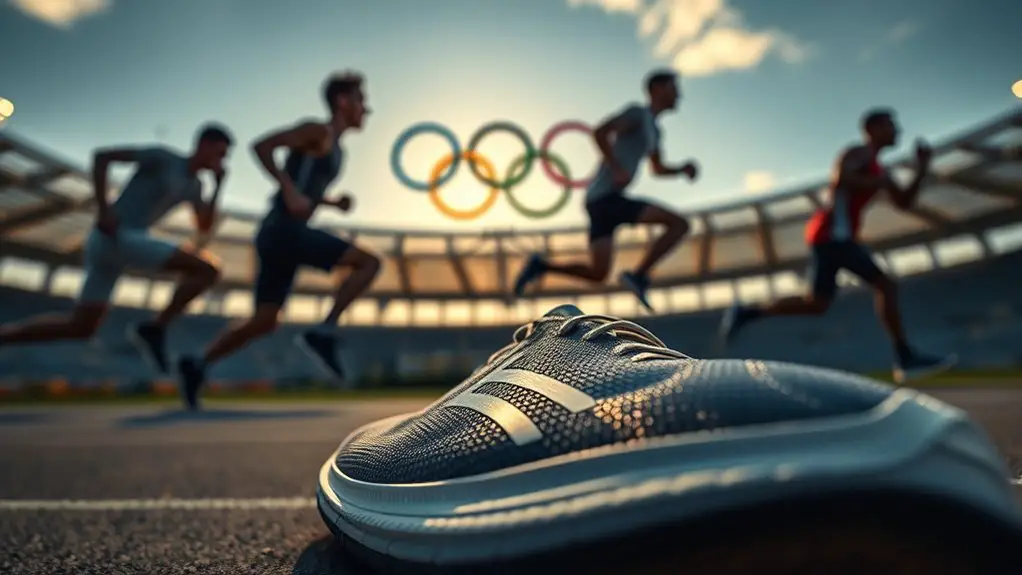Yes, athletes tend to live longer than non-athletes. This can be attributed to regular exercise, which promotes better cardiovascular health and boosts overall fitness. Athletes also benefit from healthy eating habits, strong social connections, and effective stress management, all of which contribute to longevity. Despite potential injuries from intense training, their active lifestyles support both physical and mental well-being. If you keep exploring, you’ll uncover more intriguing factors that influence athlete longevity.
The Science Behind Longevity in Athletes
While many factors contribute to longevity, the science behind athletes living longer often centers on their active lifestyles, which promote better physical and mental health. By engaging in rigorous exercise physiology, athletes enhance their health metrics, effectively combating aging effects. Longevity research shows that an athlete lifestyle fosters resilience factors, allowing individuals to adapt and thrive amidst life’s challenges. Embracing current fitness trends and wellness practices, they cultivate habits that support performance longevity. Sports medicine also plays an essential role, helping athletes understand their bodies better. Ultimately, these elements intertwine, creating a dynamic that not only extends life but enriches it, granting you the freedom to enjoy a vibrant, active existence well into your later years. Additionally, quality sleep significantly contributes to an athlete’s ability to recover and perform optimally.
Physical Fitness and Its Impact on Lifespan
Physical fitness plays an essential role in determining your lifespan, as regular exercise not only keeps your body strong but also greatly enhances your overall health. By developing consistent exercise habits, you can boost your cardiovascular health, reducing the risk of chronic diseases. Think about it: when you prioritize fitness, you’re not just investing in your present; you’re also paving the way for a longer, more vibrant future. Engaging in activities you love can make it easier to stick to those habits, giving you the freedom to enjoy life to the fullest. So, whether it’s running, dancing, or hiking, find what moves you, and embrace it. Staying hydrated is also crucial for optimizing athletic performance, which contributes to your overall health and longevity. Your body will thank you, and your lifespan could benefit considerably.
The Role of Genetics in Athletic Lifespan
When it comes to athletic lifespan, genetics play a vital role that can’t be overlooked. You might find it fascinating how certain inherited traits can predispose individuals to longevity and athletic performance. Understanding these genetic factors can shed light on why some athletes seem to thrive longer than others.
Genetic Predispositions to Longevity
Although athletes often benefit from rigorous training and ideal nutrition, genetic predispositions also play an essential role in determining their lifespan. You might not realize that certain genetic markers can influence how your body responds to stress, recovery, and even aging. These inherited traits can provide a natural advantage, setting the stage for a longer, healthier life. For instance, some people possess genes that promote efficient metabolism and repair mechanisms, allowing them to thrive well into old age. While dedication and hard work are vital, embracing the role of genetics in your athletic journey can empower you. It’s about finding that balance between nurturing your physical abilities and acknowledging the unique blueprint you were born with.
Impact of Athletic Genes
Genetic factors not only influence your predisposition to longevity but also play a significant role in how your body performs as an athlete. Certain athletic traits, like endurance or speed, often stem from specific genetic markers that shape your physical capabilities. If you’ve got the right genes, you might find it easier to excel in your chosen sport and maintain your health over time. Understanding these genetic influences can empower you to harness your potential and make informed choices about training and lifestyle. While genetics isn’t everything, it can set the stage for your athletic journey. Embracing your unique genetic makeup can help you push boundaries and enjoy a vibrant, active life. After all, freedom in sports comes from knowing what you’re capable of!
Common Injuries and Their Long-term Effects
As an athlete, you’re likely aware that injuries come with the territory, but their long-term effects can be more significant than you might think. Chronic joint pain, head trauma, and recovery issues from muscle strains can haunt you long after the game is over. Let’s explore how these common injuries can impact your life and longevity. Implementing proper warm-up techniques can help mitigate the risk of these injuries and promote longevity in your athletic career.
Chronic Joint Pain
While engaging in sports can enhance overall health and fitness, it often comes with the risk of injuries that can lead to chronic joint pain later in life. You might find yourself dealing with nagging aches from conditions like arthritis or tendonitis, which can hinder your freedom to move. Prioritizing joint health is essential; simple measures like strength training, proper warm-ups, and listening to your body can go a long way. When chronic pain arises, effective chronic pain management strategies—like physical therapy or gentle exercises—can help you maintain mobility. Embracing a proactive approach can keep you active and enjoying life, allowing you to savor every moment without being held back by pain. Remember, your joints deserve care!
Head Trauma Consequences
Engaging in sports not only poses risks for chronic joint pain but also raises concerns about head trauma, particularly in contact sports like football and boxing. You might experience concussion symptoms such as headaches, dizziness, or confusion, which can lead to cognitive decline if not addressed. Brain trauma isn’t just a temporary setback; the long-term effects can impact your neurological health and overall mental wellness. Recovery strategies like rest and gradual return to play are essential for healing. Injury prevention techniques, including proper training and protective gear, can help reduce the risk of head injuries. By staying informed and prioritizing your health, you can enjoy the freedom of sports while minimizing the risks associated with head trauma.
Muscle Strain Recovery Issues
Muscle strains are among the most common injuries athletes face, often leading to challenges in recovery that can linger long after the initial pain subsides. You might find that these strains affect not just your performance, but also your overall well-being. To enhance muscle recovery and focus on strain prevention, consider these tips:
- Rest & Ice: Allow muscles time to heal while reducing inflammation.
- Gradual Return: Ease back into activity to avoid re-injury.
- Strength Training: Build muscle resilience to prevent future strains.
- Proper Warm-up: Always warm up to prepare your body for action.
- Nutrition: Fuel your body with the right nutrients to support recovery.
Nutrition Choices of Athletes
When it comes to nutrition choices, athletes often prioritize foods that fuel their performance and recovery. You’ll find that a balanced approach is key. Here’s a quick overview of essential nutrition components:
| Nutrition Aspect | Description |
|---|---|
| Plant-Based Diets | Focus on whole, nutrient-dense foods |
| Hydration Strategies | Maintain fluid balance for peak performance |
| Meal Timing | Maximize energy management around workouts |
Mindful eating and macronutrient balance play vital roles, especially in pre-game meals and post-workout nutrition. Supplementation choices can also enhance recovery. By prioritizing these elements, you can guarantee you’re fueling your body effectively and prolonging your athletic career. Additionally, understanding macronutrient balance is essential for optimizing endurance and performance.
Mental Health and Its Influence on Longevity
Athletes often focus on their physical health and performance, but mental health plays a significant role in overall longevity. Developing mental resilience and effective stress management can enhance your emotional wellbeing, which is vital for a fulfilling life. Here are some key aspects to take into account:
Mental health is crucial for athletes, enhancing longevity and emotional wellbeing through resilience and stress management.
- Positive mindset: Cultivating optimism can lead to better health outcomes.
- Social support: Building strong relationships helps you cope with life’s challenges.
- Mindfulness practices: Engaging in mindfulness can reduce anxiety and improve focus.
- Coping strategies: Finding healthy ways to handle stress is essential for longevity.
- Psychological benefits: A strong mental state can lead to greater physical health. Additionally, incorporating breathing techniques can significantly lower heart rate and enhance focus, contributing to overall mental well-being.
Comparing Lifespan: Athletes vs. Non-Athletes
While it’s often assumed that athletes enjoy longer lifespans due to their rigorous training and healthy lifestyles, the reality is more complex. Sure, athletes benefit from exercise, which boosts health metrics and promotes better lifestyle habits. However, age factors and training intensity can lead to injuries, which may counteract those benefits. Non-athletes often adopt their own nutrition strategies and fitness trends that support longevity, albeit in different forms. Sports psychology also plays a role, influencing how both groups approach stress and recovery. Ultimately, while athletes may have an edge through dedicated injury prevention and recovery techniques, a balanced lifestyle can equally enhance longevity for everyone. It’s all about finding what works best for you. Incorporating rest days into training programs is essential for overall performance and longevity.
The Importance of Recovery and Rest
When you think about athletic performance, recovery and rest might not be the first things that come to mind, but they’re essential. Active recovery can help your body repair and reduce injury risk, while quality sleep plays an important role in enhancing your performance. Ignoring these aspects can set you back, so let’s explore how they contribute to longevity and athletic success. Incorporating active recovery strategies like low-intensity activities can enhance your post-workout recovery and overall performance.
Active Recovery Benefits
Although you might think that pushing your limits is the key to performance, incorporating active recovery is crucial for long-term success and longevity. Embracing recovery techniques not only enhances your physical health but also boosts your mental well-being. Here’s why active recovery is essential:
- Improves blood circulation, aiding muscle repair
- Reduces soreness and stiffness after intense workouts
- Enhances flexibility and range of motion
- Helps maintain a balanced routine, preventing burnout
- Supports mental clarity and focus
Sleep’s Role in Performance
Active recovery is just one part of the larger puzzle that contributes to athletic performance, and sleep plays a significant role in this equation. You might not realize it, but your sleep quality directly impacts your recovery and overall performance. Sleep deprivation can lead to poor sleep habits and negatively affect your sleep cycles, hindering your ability to reach deep sleep and REM sleep stages. Prioritizing appropriate sleep duration guarantees you get the recovery sleep your body craves. Consider incorporating napping benefits into your routine for added rest. Awareness of sleep disorders is vital, too; they can disrupt your performance. Embrace the freedom that comes with optimizing your sleep, and watch how it elevates your athletic game.
Lifestyle Choices Beyond the Field
While many athletes excel in their sports, their lifestyle choices off the field often play a crucial role in determining their longevity. Embracing healthy habits and balancing life outside of competition can help you thrive. Consider these key areas to enhance your well-being:
- Mindfulness practices: Engage in meditation or yoga for better focus.
- Stress management: Find techniques to cope with pressure, like deep breathing.
- Social connections: Surround yourself with supportive friends and family.
- Community involvement: Give back through volunteering; it can boost your happiness.
- Recreational activities: Enjoy hobbies that let you unwind and recharge. Additionally, incorporating mindfulness meditation can enhance your focus and resilience, ultimately contributing to a longer, healthier life.
Lessons From Athletes for a Healthier Life
When you look at the lives of athletes, you often find valuable lessons that can inspire healthier choices in your own life. They emphasize the importance of mindful eating, recognizing that what you fuel your body with directly impacts your performance and well-being. By choosing whole, nutritious foods, you can enhance your energy and mood, leading to a more vibrant life.
Additionally, athletes excel in stress management, utilizing techniques like meditation and visualization to stay focused and calm under pressure. You can adopt these practices too, creating space for relaxation and reflection in your daily routine. Furthermore, adequate protein intake supports muscle recovery, which is crucial for maintaining overall physical health and vitality. By embracing these lessons, you’re not just aspiring for fitness; you’re embracing a lifestyle that nurtures both your body and spirit, granting you the freedom to truly thrive.
Frequently Asked Questions
Do All Athletes Experience the Same Health Benefits?
Not all athletes experience the same health benefits. While some might thrive from intense training, others may face injuries or burnout. Individual differences in genetics, lifestyle, and mental health play a huge role. Plus, sport variations can lead to different physical demands; for example, a marathon runner’s body responds differently than a weightlifter’s. Ultimately, each athlete’s journey is unique, and it’s essential to embrace your own path to well-being and freedom.
How Does Age Affect an Athlete’s Longevity?
Age can notably affect an athlete’s longevity, as you may notice that age-related decline in physical abilities often sets in. While training can help mitigate some effects, injuries can impact your performance and recovery. As you get older, it’s essential to adapt your training and listen to your body. Embracing a balanced lifestyle can help you maintain freedom in your activities, allowing you to enjoy sports longer and more fully.
Can Non-Athletes Adopt Athlete Lifestyles for Better Health?
Absolutely, you can adopt an athlete’s lifestyle for better health! Imagine the difference between lounging on a couch and sprinting under the sun. By incorporating fitness routines like strength training or cardio into your daily life, you’ll feel energized and alive. Embracing lifestyle changes like balanced nutrition and regular exercise can free you from lethargy and boost your well-being. Start small, and soon you’ll be racing toward a healthier, more vibrant you!
What Role Does Mental Health Play in Athletic Longevity?
Mental health plays a huge role in athletic longevity. You’ll find that mental resilience helps you push through challenges, while effective stress management can prevent burnout and injuries. When you prioritize your mental well-being, you’re not just enhancing performance; you’re also setting yourself up for a longer, healthier journey in sports. Embracing practices like mindfulness and self-care can empower you to thrive, both on and off the field, ultimately contributing to your longevity.
Are There Specific Sports Linked to Longer Lifespans?
Certain sports are indeed linked to longer lifespans! For instance, studies show that endurance athletes, like runners and cyclists, often enjoy a 20% lower mortality rate than the general population. Team sports can foster social connections, while individual sports, like swimming, promote mental well-being. Even extreme sports enthusiasts tend to have a zest for life that keeps them active. So, if you crave freedom, exploring these sports might just be your path to longevity!




